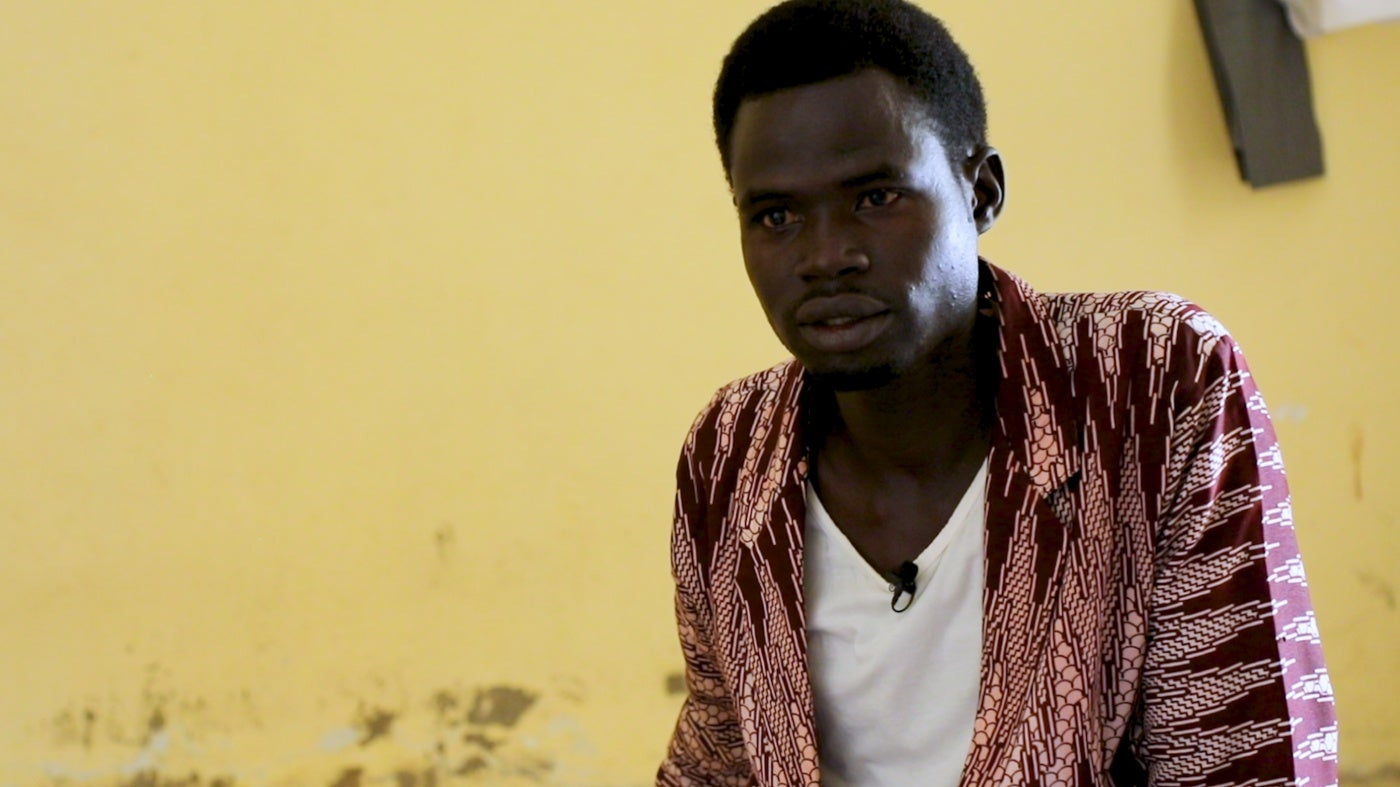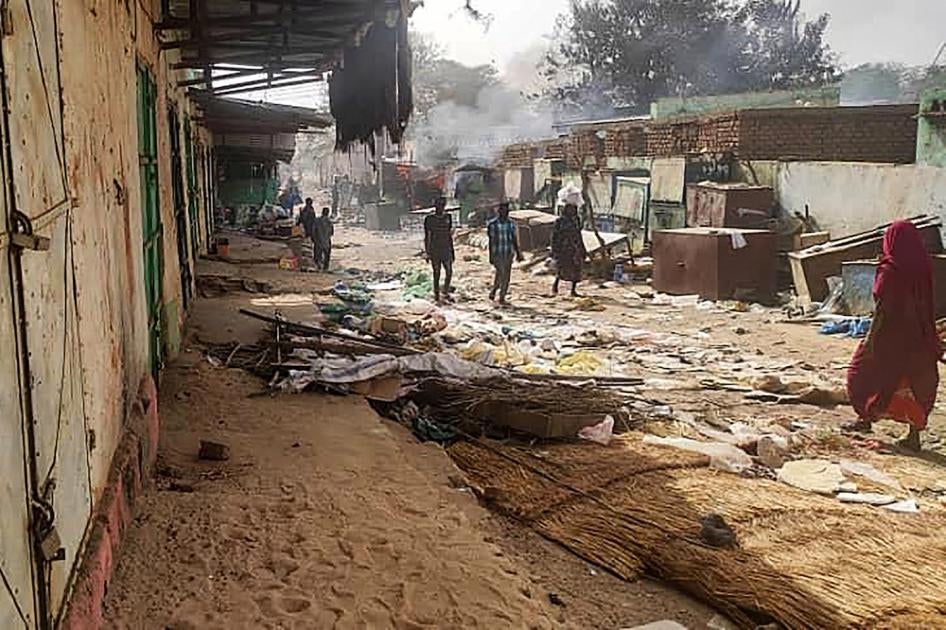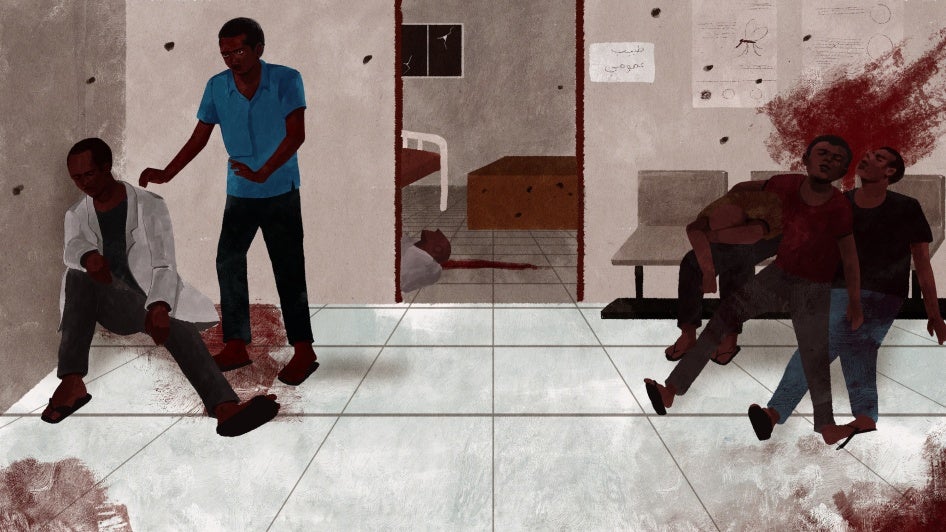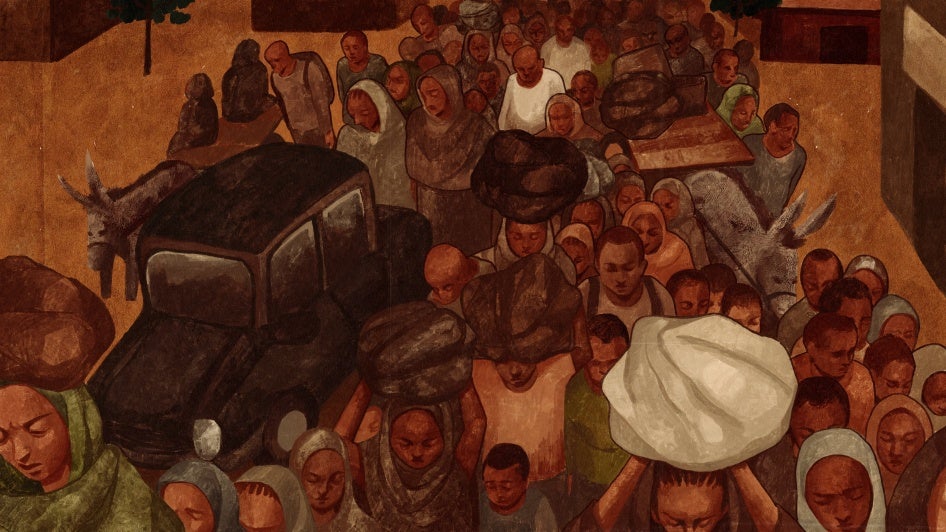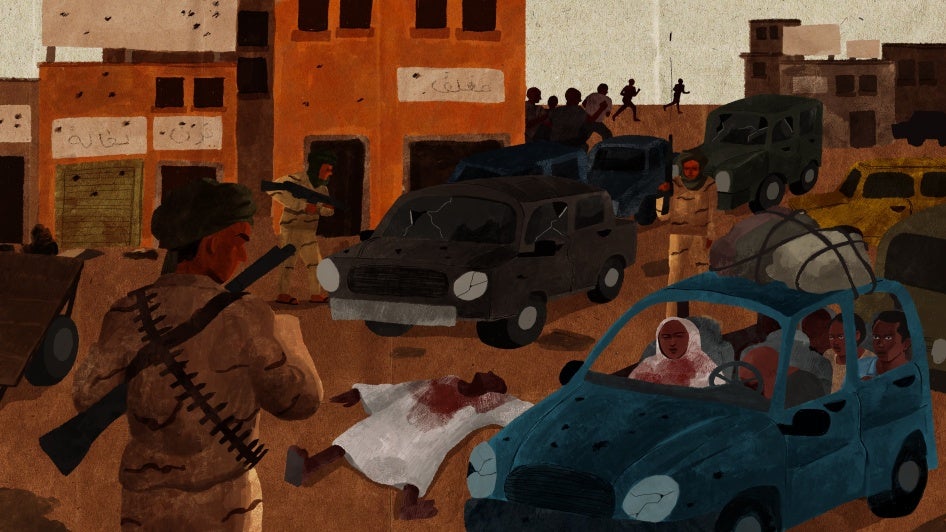Ultimately, the atrocities and discrimination he faced as a member of West Darfur’s Massalit community led him to become a human rights defender – a person who documents human rights violations and helps gather evidence that could lead to justice. He went to law school and, afterwards, established a human rights organization named al-Juzur (Roots in English).
In April 2023, fighting broke out and quickly spread as the Rapid Support Forces (RSF), an independent military force, and allied militias fought Sudan’s army. In El Geneina, the capital city of West Darfur where Jamal lived, the RSF and affiliated militias, both of which include former Janjaweed, once again targeted people on an ethnic basis, echoing the atrocities of 20 years ago.
At first, Jamal and his colleagues documented the waves of attacks by the RSF and the militias. These forces attacked the predominantly Massalit areas of El Geneina, killing, raping, and torturing people as well as assailing people displaced by previous bouts of violence, and at times, destroying whole neighborhoods. The onslaught targeted Massalit and other non-Arab groups in a campaign of ethnic cleansing – with atrocities that amounted to war crimes and crimes against humanity.
By mid-June 2023, the unrelenting attacks on Jamal’s community reached a crisis point and he fled for his life.
“I didn’t think I would survive this,” Jamal said.
West Darfur
Jamal faced discrimination from the beginning of his life. “We were ethnically discriminated against in the schools. We were targeted based on our skin color. We used to be beaten up when we spoke our mother [tongue], we were asked to speak only in Arabic,” he told Human Rights Watch from a refugee camp in Chad. His family lived in West Darfur, in the ethnically diverse state in western Sudan that Massalit people see as their homeland. At the time, Sudan’s federal government imposed an Arab-centric culture on everyone.
In 2003, armed groups from non-Arab communities in Darfur, including Massalit, revolted against Sudan’s authoritarian government. They wanted to end the government’s Arabization agenda, oppressive policies, and the economic and political marginalization of western Sudan. In response, between 2003 and 2005 government forces and Janjaweed militias, which recruited members from nomadic Arab communities who frequently fought with Massalit farmers over water and land, carried out an ethnic cleansing campaign against non-Arab communities, killing hundreds of thousands. The International Criminal Court indicted Sudan’s then-president, Omar al-Bashir, for the crime of genocide, war crimes, and crimes against humanity.
During this ethnic cleansing campaign, Jamal witnessed attacks on his largely Massalit village, and when he was 10, he saw his uncle ambushed and killed. “I lost so many family members from both my mother and father’s side, especially my father’s … [dozens] of them were killed during these wars and clashes.”
While he studied law at a university in Sudan’s capital, Khartoum, Jamal headed the Association of Students of Darfur and was arrested four times there for protesting massacres and discrimination in Darfur. After passing the international bar association exam, he returned to West Darfur, where he founded Juzur in El Geneina.
“I felt that my duty is to spend my whole life defending and fighting for human rights,” he said.
Renewed violence
In October 2021, two generals staged a coup in Sudan, ending a period of transition that was meant to lead to the emergence of a civilian-led government. Roughly 18 months later, on April 15, 2023, fighting broke out in Khartoum between the forces these generals controlled, the Sudanese Armed Forces (SAF) and the RSF.
The RSF had been established nearly a decade before that to formalize the Janjaweed among other government militias. The RSF committed widespread abuses in Darfur and beyond since then.
“I woke at 7 a.m. in the morning on April 24. While I was brushing my teeth I heard [rocket fire] very close to my house, around 500 meters away,” he said. “It escalated quickly. Later we learned that clashes had erupted between the Sudanese Army Forces and the Rapid Support Forces.” The RSF headquarters was located near Jamal’s home in the al-Jamarek neighborhood.
Events escalated rapidly. Jamal said that the next day, the offices of several international organizations were raided. “Medical supplies, cars and ambulances were stolen from the Ministry of Health building. El Geneina Teaching Hospital and [the building with] blood banks were also broken into. Medical equipment and supplies were stolen by the militias and the RSF,” Jamal said. His home was attacked, and his family fled, leaving everything behind.
In the following days, these forces looted the market, burning shops, Jamal said. Juzur’s office was attacked as well; fortunately, no one was killed. A second attack on Juzur’s office roughly two weeks later, though, would leave one of Jamal’s colleagues dead, their library torched, and office equipment destroyed.
“April 27 was one of the bloodiest days,” he said. The RSF and militias attacked camps housing internally displaced people, as well as schools and mosques.
After the first four days of heavy attack, there was a lull in large-scale attacks, but the abuses continued. Jamal believed the forces were trying to besiege his community: “There was a siege around the city with snipers on the main roads of El Geneina, it was impossible to even go get food or drinking water. That was their starvation plan, to kill people out of hunger and thirst. If you tried to go out, you [would] get shot immediately.” The RSF and allied militias also set fire to water stations and destroyed wells.
On May 12, the attacks ramped up again. By now, most Massalit people in and around El Geneina had fled to be near the general secretariat, a government building, and the governor’s house, where Massalit self-defense forces had gathered. The crowding meant “very poor living conditions,” including the spread of measles, according to Jamal. This was “in addition to the huge numbers of wounded and injured people who couldn’t access the needed healthcare.”
From the onset of the fighting, the RSF and their allies targeted Massalit people and other non-Arabs. “They were also systematically hunting and targeting the activists, educated [people] and human rights advocates,” Jamal said.
Jamal and his colleagues from Juzur used paper and pen to document as many attacks as they could, inputting what they learned into the single laptop they shared. Twelve people killed while sheltering in girls’ schools. Five people, including a child, killed in a mosque. Eight people trapped and killed in their home. And on and on.
During seven weeks of attacks, the SAF were not there to protect the people of El Geneina. They had retreated to their headquarters in Ardamata, Jamal said, a short distance north of the city, on the first day of the fighting. Only the Massalit self-defense groups were left to protect the community and fight the RSF and affiliated militias, he said.
The Clinic
During the conflict, injured Massalit people only had access to a handful of volunteer-run makeshift clinics. At one of them, the Sadaqa clinic, Jamal said he and his colleagues documented the cases of people who were brought there – close to 1,000 deaths and 2,000 injuries from late April until mid-June. For their part, the activists from Juzur brought the doctors meals and water.
On May 14, Jamal’s friend, Mudather Abdallah Abdel Rahman, called to say he was injured, and he asked Jamal to come to another clinic, which Dr. Mohamed Adam Khatir had founded in his home. But as Jamal neared the clinic, he saw RSF fighters and ducked into a nearby house. The fighters fired their weapons into the clinic; screaming followed. Then silence. Jamal waited until they were gone and then went into the clinic. Twelve people were dead, including doctors he knew.
“I found my friend Mudather … sitting casually and resting his head on his hand as if he were sleeping. He looked very normal. I started calling his name to wake him up. I shook his hand and then his legs. Then I realized he was dead.”
In June, the attacks escalated in intensity. On June 14, the RSF and allied militias staged attacks across El Geneina’s neighborhoods. It was also the day West Darfur’s governor – a man who had met with Jamal and other activists to hear their concerns – was brutally killed, last seen in the custody of the RSF.
Also on June 14, the defenses staged by the Massalit fighters collapsed.
On the Run
Between late April and the end of June, an estimated 167,000 people fled from Sudan to Chad, the vast majority from West Darfur. As of early May 2024, over half a million had crossed.
After the attacks of June 14, 2023, tens of thousands of people in El Geneina decided to flee at the same time in a convoy, kilometers-long, heading north through the city and towards the Sudanese army’s military base at Ardamata, about six kilometers from downtown El Geneina.
Jamal had – repeatedly – decided to stay. “It [is] hard to escape and leave your family behind,” he said. “It [is] so hard to leave your country, we are very sentimental, we are attached to our homes and our people.”
But now, as violence consumed his city, he decided to flee.
He and his friend, Yousef Haroun Kabello, who was injured, took a car with acquaintances. But because of the crowds, the pace of evacuation was glacial.
“Some [people] were riding on donkeys’ and horses’ backs,” Jamal said. “Some were taking cars, some were going on motorbikes and rickshaws. Some injured people were being [transported] on wheelbarrows. Some people were walking while carrying their elderly and injured people on their backs. The street was narrow and crowded, people [were] moving in one long line.”
The throng’s size and slow speed left them vulnerable.
Shortly before sunrise, near the northern al Naseem neighborhood, people wearing RSF uniforms and allied militias appeared, ordering everyone in cars to get out. The armed forces shot out the car tires, then fired into the crowd. “They were shooting on … children, women, old and young men. Everyone,” Jamal said.
Jamal and Kabello ran and hid in a pharmacy. “We witnessed the massacre happening live, hundreds of people dropped dead and injured in front of us.”
They tried to run and cross a nearby wadi – Arabic for a seasonal riverbed – but were surprised to find it full of water – and Kabello couldn’t swim.
Hundreds of panicked people started fleeing into the stream, Jamal recalled. The armed men “shot them inside the water. Some people were shot before entering the water.” The armed men used machine guns, rifles, and Dushkas, a heavy Soviet machine gun, he said.
He and Kabello doubled back. “We found many dead bodies scattered everywhere. Some of them people we knew, but of course we couldn’t even stop or try to check on them.” They fled with three women, who, when they stopped to discuss a hiding spot, were shot from behind. Three male youths who went back to check on them were also shot.
Jamal, Kabello, and others switched direction from the army base, now heading west towards the Chadian city of Adré, about 35 kilometers from El Geneina. Jamal spotted a friend driving an uncovered truck carrying women and children, and he asked him to also take Kabello. “He said his vehicle was already full, but we managed to squeeze him [Kabello] in. But there was no place for me.” Jamal followed behind on the dirt road by foot.
Ambushed
Jamal and others in the crowd were far behind the Massalit fighters of the Sudanese Alliance when vehicles carrying RSF fighters and other militias appeared on the road on the western outskirts of El Geneina. “They opened fire on the crowds, and they killed [many] people.”
Jamal ran away, and a 9-year-old child, crying hysterically, ran after him, trying to grab him. When the child caught him, Jamal fell. He was exhausted. He told the child to run, but the child was too scared. Instead, they hid among small bushes.
RSF fighters found them and others, Jamal said, and took their phones and money, beating them with whips, iron bars, and the stocks of their rifles. At one point, the RSF ordered everyone – there were seven of them – to lie down, faces to the ground. “The beating and torturing intensified. The kid couldn’t stand that anymore, and he got up,” Jamal said. “They immediately shot him in the head.”
Eventually, the fighters released those who survived, and they hid again, only to be found by another group of RSF fighters. This group opened fire near Jamal’s hiding place to flush him out, shouting ethnic slurs referring to black people.
A fighter ordered Jamal to lie down, facing Mecca, the direction which Muslims face to pray. He ordered Jamal to say the Shahada, an Islamic declaration of faith one makes before dying, three times. Then the fighter asked Jamal if he’d like to be shot or have his throat slit.
“I said ‘shoot me.’”
The RSF fighter prepared his weapon for firing before asking, “Should I kill you or spare you?”
“I said ‘spare me.’”
And the fighter did.
They released the whole group. It was June 15, time for evening prayer, Jamal noted. It was also about to rain.
Fleeing to Chad
Jamal and five others decided that to survive they needed to get to Adré, Chad.
They waited until the deep of night to travel to better avoid more forces. None in the group had traveled to Chad before, but they heard you could see Adré’s lights from a distance.
They walked silently through the bush, avoiding roads.
They came to a mountain and saw a large group of people – there could be safety in numbers – but this group made noise and smoked cigarettes, so Jamal’s group left. They found water at the mountaintop, then descended the mountain and arrived in the Sudanese border town, Adikong.
They kept walking as the sun rose. They knew they must be close to Chad.
Suddenly, they saw two men in RSF uniforms to the west. The men called them over, but Jamal and the others ran in the opposite direction. “They started firing bullets above our heads.”
Then, ahead of them, they saw men with whips and uniforms that looked like RSF who also called out to them. In fear, they turned around again, to run back. But these men ran after them, saying they were from the Chadian army, showing them the Chadian flag on their uniforms, that this was the border to Chad. Once Jamal and the others realized they really were Chadian soldiers, they crossed the Sudan-Chad border to safety.
“They welcomed us and told us that we are safe … and told us that many of our people had arrived before us,” Jamal said.
Across the border, “we found community, they gave us biscuits, tea, and food,” Jamal said. People arrived in Adré barefoot, and people bought them new shoes.
“The solidarity they offered us was unmatched,” Jamal said. “I arrived in Douane Souq [market] barefoot. People began hugging me and crying, and military men were also hugging us and crying. They felt our agony, sympathized with us and offered us everything.”
Soon after, Jamal collapsed and was taken to the hospital. “There I found my friend Kabello! He made it safely, with another man from his group.” However, the sixteen other companions in the car, including the driver, had all been killed.
Jamal faced struggles in Adré. While new camps had been built for the influx of people from West Darfur, the quality of water and food was poor. People also feared that the RSF or Arab militias would infiltrate the camps. “We ran into militiamen in the Adré market,” he said. Jamal and others received threatening messages via WhatsApp and Messenger.
Still, he has hope. “I hope that [West] Darfur … will recover and become a safe haven for us, and [that] we go back in the near future.” But for this to happen, he believes, local, national and international organizations need to work together and end the conflict. It also requires the establishment of a justice system – he’d like to see a joint court operated by teams from Sudan, Africa more broadly, and the International Criminal Court – where perpetrators can be held accountable for the human rights abuses that they committed. Also, it’s not just the RSF and allied militias who should be condemned, he said, but also the Sudanese army for not protecting civilians.
This is what he’s waiting for: justice and peace for West Darfur and all of Sudan.
Timeline of key events in El Geneina from April to November 2023
This timeline highlights selected key incidents which happened in El Geneina before, during, and immediately after the main attacks on the Massalit population of the city.
